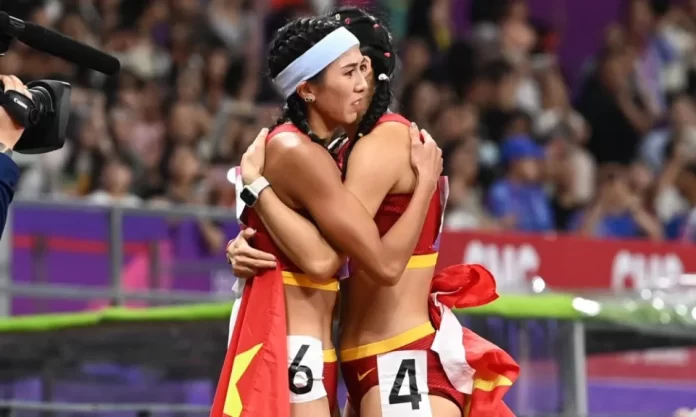In a surprising turn of events at the Asian Games in Hangzhou, a heartwarming photograph capturing the embrace between Chinese athletes Lin Yuwei and Wu Yanni became the center of attention, but not for the reasons one might expect. Lin clinched gold in the women’s 100m hurdles final with an impressive time of 12.74 seconds, and their celebratory hug made headlines. However, a peculiar coincidence led to the photograph’s censorship on Chinese social media.
The photograph, which displayed the athletes in profile, showed Lin’s lane number as 6 and Wu’s as 4, inadvertently forming the numbers “6/4.” This combination of numbers is a sensitive reference to the tragic Tiananmen Square massacre of June 4, 1989. Discussion of this historical event and the protests that surrounded it is strictly controlled in China, resulting in the swift removal of content containing such references.
Posts on Weibo featuring the two athletes hugging were replaced with grey squares, illustrating the extent of the censorship. It’s important to note that the censorship wasn’t uniform, as some Chinese news articles continued to display the photograph with the lane numbers intact. Internet censorship in China, especially regarding images, often relies on human monitors who decide which content to restrict. In 2017, Weibo, one of China’s largest social media platforms with nearly 600 million monthly users, revealed it employed 1,000 “supervisors” to address “pornographic, illegal, and harmful” content.
The race itself, which coincided with China’s National Day on October 1, was marked by another controversy involving one of the Chinese athletes. Wu was initially disqualified with a red card at the race’s start due to a false start. After a protest, she was eventually allowed to compete, finishing second, only 0.03 seconds behind her teammate Lin. However, Wu was later disqualified, granting India’s Jyothi Yarraji the silver medal.
This decision to allow Wu to run despite the initial disqualification raised concerns that race officials might have been hesitant to disqualify one of China’s star athletes, potentially overlooking sporting rules. Sports analyst Mark Dreyer, who was present at the event, commented, “It just felt like the local officials needed to find a way to let Wu run.”
Hours after her disqualification, Wu took to Weibo to apologize to her fans, expressing regret for her false start. Her post received tens of thousands of supportive comments. In contrast, posts by ordinary netizens on Weibo featuring the greyed-out squares of Wu and Lin’s “6/4” hug received more muted responses. One Weibo user simply wrote, “The 1989 Asian Games.”




















